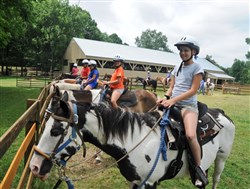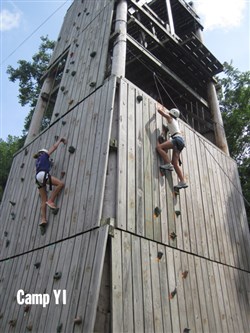VOL. 37 | NO. 5 | Friday, February 1, 2013
Classic camps still hold appeal
By Hollie Deese

Camp Widjiwagan, located on 320 acres with four miles of shoreline on Percy Priest Lake, is owned and operated by the YMCA of Middle Tennessee.
-- Photo Courtesy Of Camp WidjiwaganThe longer a camp has been around, the more time it has had to create its own community, its own particular Middle Tennessee experience.
These decades-old, bucolic camps in Williamson, Davidson and Rutherford counties offer an escape from every-day reality, including all forms of technology. The experience at these camps is about face-to-face friendship, not Facebook.
Camp Marymount
Each summer, Tommy Hagey packs his eight children and wife, leaves their West Meade home and spends time somewhere farther south in a place that is a little more rustic – the 340-acre Camp Marymount property in Fairview.
And while the physical distance is just a few miles, the mental break he says it affords all the children who attend the camp is immeasurable.
“Every one of our kids has grown up here,” says Hagey, executive director of the camp. “They have never lived in their own house in the summertime. So they have grown up running through creeks and catching snakes.”
In fact, so did Hagey. He was a camper at Marymount in 1974, then a counselor from 1983 to 1989 before joining the summer staff. He became executive director in 1997. When he was 21, he met his future wife Margaret, then an18-year-old counselor who had spent each summer at Marymount since she was 7.
“You just see who they really are,” Hagey says of the 600 campers from 20 states and Mexico who come to Marymount each summer. “They can shed all the faces they have to create out in the public and they can just be who they are and be accepted.
“I think that kind of atmosphere, the community that is created here, is all under the basis of a rustic, no-frills kind of atmosphere. It really takes away all the pressures of life.”
Marymount is a Catholic camp that started in 1939 in Joelton under the name Camp Happy Hollow. In 1945, Monsignor George Rohling found he couldn’t resist 147 acres in Fairview to expand the facilities -- and hope for permission from the diocese after the fact.
“He realized there was a big demand for this camp, but it was only on about 16 acres of land,” Hagey says. “He saw an ad in the paper after looking one time and saw a listing for a fishing camp in Fairview. He came out and looked around and liked what he saw.

A massive climbing tower, ropes courses and skiing on Percy Priest Lake are a few of the features of Camp YI, which has been operating in Rutherford County since 1945.
“It had a five-acre, spring-fed lake and lots of spring-fed creeks and hills. He told the guy ‘sold’ and signed a contract, but you really couldn’t or shouldn’t do that without permission from the diocese. But he just knew this was the right place.”
Luckily, the diocese did, too, and reimbursed him. The new camp was named in honor of the Virgin Mary and saw its first campers in the summer of 1946. About four years ago, some facilities were rebuilt and winterized, which allows them to host retreats and business events in cooler months.
But the main mission is the summer camp.
“Our niche is a very traditional, throwback-in-fun kind of thing,” he says. “We run very traditional activities for a camp. We don’t have computers the kids can get access to. There are no boats or water skiing, but we have canoes. There is horseback riding, there is nature.
“I think in today’s world, we are trying to provide our kids with the latest and greatest. And we sometimes overlook the oldest and the best.”
Camp Widjiwagan
When the original Camp Widjiwagan, which opened in 1948, closed in 1972, a group of parents who volunteered at the YMCA refused to see the camp experience slip away for their children.
“They said if you really want to have a significant impact on the next generation of leadership in Nashville, the Y needs to get back into the camping business,” says Mark Weller, executive director for Camp Widjiwagan. “So this group of parents and some Y folks began searching for 50 acres and a pond to run a regional day camp.”
What they found and bought was the 320 acres with four miles of shoreline on Percy Priest Lake. “So the Lord had a bigger idea than they had,” Weller says.
The camp opened in 1998 as a regional day camp, with the goal to offer a depth and quality in the staffing and programming and facilities that would be around for 100 years.
“We kind of joked that we had two seasons, summer season and construction season,” Weller says. “We would build a little bit then open for the summer, then build a little bit and open for the summer.”
By 2005, everything on their master plan had been built. A marketing study was done to see what else was needed.
“The marketing study clearly said there was a need for an overnight camp in Middle Tennessee,” Weller says.
“And they followed that up with a feasibility study that said we could raise the funds to build it. We began that process and in 2008 opened the overnight resident camp.”
Widjiwagan brings in staffers from as far away as the United Kingdom, Norway, Prague and Bosnia to blend in with the local counselors.
“We hire about 200 counselors in the summer and we look far and wide,” he says. “Of course, we recruit a lot of local students from the local Middle Tennessee area. We want kids and parents to be bumping into these counselors year round in restaurants and movie theaters. It is part of that relationship building.’’
Technology is not allowed at the camp, so campers learn how to develop relationships face-to-face, a skill necessary in an online society.
“We want them to forge new friendships, and not the Facebook kind of friend. Believe it or not, there is actual teaching that has to happen nowadays, not only about how to be a friend but to make a friend.
And that takes hard work, working on a real friendship face to face.”
Classic outdoor activities like boating (Camp Widjiwagan is the only camp in the state that can issue a boater’s license), horse climbing and hiking all help build confidence for the thousands – about 3,300 last year – who attend the camp each year.
“We want kids to overcome some fears, try new things and develop new skills so when they go back to school in the fall, they are standing a little bit taller,” Weller says.
“They are more confident in themselves and what they are able to do. We want them to strengthen their confidence, we want them to forge friendships and we want them to sharpen their character.
“And if all of those things can happen in every single one of our activities, then we feel like we have been successful with these kids.”
Camp YI
Out in Rutherford County on undeveloped Corps of Engineers property, about 500 campers have been calling CampYI (Youth Incorporated) home each summer since 1945.
The activity-based camp used to exist on 640 acres until 1968 when the Stones River was dammed.
The land flooded, and the camp is now on 175 acres with private dock access to Percy Priest Lake.
“We are a pretty well-kept secret even though we are not trying to be,” says Kim Hutchison, executive director and former Camp YI camper.
“People grew up around here but never knew we were here. It is a beautiful piece of property. We have a huge amount of ropes courses, a climbing tower, skiing on the lake. We do things that kids don’t get elsewhere.”
And while Camp YI offers everything from archery to horseback riding lessons, Hutchison feels it is the lessons children learn while waiting around for their turn, learning how to share and interact, that are the most important.
“Cabin time is some of the kids’ most favorite time because they will sit and talk about things with the freedom to throw it out there without being behind a computer screen,” she says.
“We are unplugged. They play cards and board games. They have pillow fights.”
She admits training her staff is not as simple as it once was, thanks to technology.
“Staff training growing up was about cleaning up the camp and getting it ready for people to come in,” she says.
“Now, staff training is about what children get out of camp emotionally, mentally, physically and all that. It is a huge burden because most of us are not experts in that field so we have to pay people to come in and give those talks.
“We have a lot of continuing education that is helping us move into that. It is not just about ropes courses and horse training that you have to do. The other stuff, you have to touch a child in a way that is meaningful and a life lesson.
“A camp experience helps a child believe in themselves by providing opportunities to learn, but more importantly, participate in activities they are not usually exposed to.”